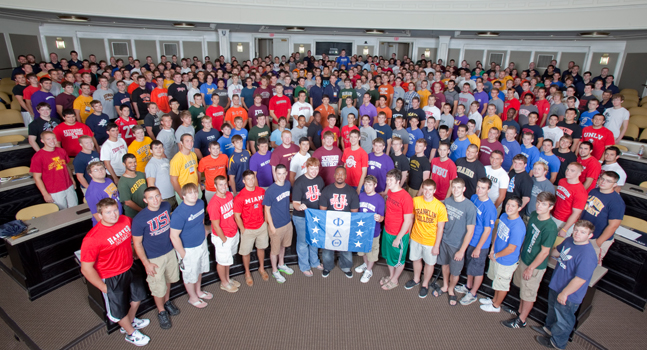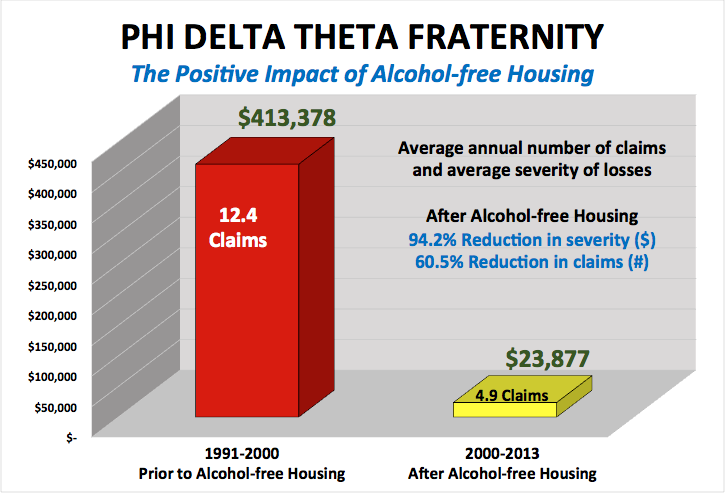The Evolution of the Modern Fraternity
By Christopher A. Lapple – President, Phi Delta Theta International Fraternity

The Dark Power of Fraternities, written on February 19 by Caitlin Flanagan of The Atlantic, caught the attention of the leadership and general membership of Phi Delta Theta Fraternity. While we are very aware of the issues that remain within the walls of fraternities, specifically alcohol-abuse and hazing, Phi Delta Theta and its bold leadership has long been making tough decisions to address them.
No parent, who has the highest hopes when their son or daughter attends college, entering the prime of their life with every good experience yet to come, should have to bury a child. Having said this, society today has become less tolerant of the behavior referenced in the article, especially when it leads to the unthinkable. Understandably, rare instances of death, injury and stereotypical behavior will always make the front page. However, it is unfortunate that positive stories about community service, philanthropy and acts of brotherhood that occur every day are either overshadowed by the bigger, more sensational story or ignored altogether.
Phi Delta Theta introduced an Alcohol Free Housing policy in 1997 with these growing concerns in mind. There was a three-year phase-in period and an implementation of the full policy on July 1, 2000. When this policy was introduced, many skeptics believed that this was the end of our organization. Many predicted the organization’s doom in five years. However, today I’m proud to report that the policy is having a tremendously positive impact, disproving our naysayers, and placing Phi Delta Theta in a much better state today than prior to this groundbreaking decision.
In the early 90s, Phi Delta Theta experienced two undergraduate member deaths. Such moments were incredibly troubling for my predecessors on our Board and they understood that they needed to tackle an issue that was bigger than just Phi Delta Theta. Their solution was to return to the values established by our Founders in 1848 and focus on the Fraternity’s three Cardinal Principles: Friendship – the cultivation of friendship among members, Sound Learning – the acquirement individually of a high degree of mental culture, and Rectitude – the attainment personally of a high standard of morality.
As Phi Delta Theta chapters and its members drifted away from the Fraternity’s true purpose and the vision of our Founders, and upon reflection of our Cardinal Principles, it pointed to a need to realign the organization’s values and actions. Such realignment occurred with the help of Alcohol Free Housing.
Once the organization’s leadership made the decision to move forward, seven goals were established alongside the institution of the Alcohol Free Housing policy: 1) return the focus to our founding principles, 2) combat an alcohol-dominated culture, 3) improve members’ academic performance, 4) stop the deterioration of chapter facilities, 5) slow the rising cost of liability insurance, 6) meet the needs of today’s college students with substantial programming and leadership education, 7) reengage our alumni members.
The return to our core values and the implementation of Alcohol Free Housing has produced overwhelmingly positive results for Phi Delta Theta and the 188 campuses where we exist. We have discovered that many students seek a values-based experience from their fraternity. From 2000, when the policy was fully implemented by all of our chapters until today, we’ve experienced a 41.37% increase in the number of new members who join our organization each year. Our total number of undergraduate members has increased 38.64%.
From a competitive standpoint, our average chapter size is 64 members, the second highest among all fraternities and up from 49 in 2000. The national average hovers around the low to mid 40s. From a chapter growth perspective, we have installed or reinstated 64 chapters since 2000. During the 2012-13 academic year, we installed eight new groups with an average size of 45 new members. We are on pace to do this again in 2013-14.
Sound learning has also improved as the organization’s collective GPA is at 3.01, up from 2.73 in 2000. In addition, our members are making smarter decisions outside of the classroom that keep themselves and their brothers safe from high-risk events. The best way to measure this success is by evaluating the number of incidents that might manifest themselves into insurance claims. We averaged 12.3 alcohol-related insurance claims per year prior to 2000 with an average annual payout of $413,378. Today, we average 4.9 claims a year with an average annual payout of $23,877. The average number of annual claims has decreased 60.5% and the severity of payout has decreased 94.2%. Because of this, our liability insurance costs have dropped substantially, thereby, offering a much more affordable and safer experience to our members. Today, the average per member insurance rate for fraternities is approximately $160 per member; our rate is less than half that at $74 per member.

Our alumni have quickly noticed the difference in our organization and have returned to be involved as advisers and mentors. In 2000, we had approximately 200 advisers. Today, we have 885, a 342.5% increase. Because of the positive effects of Alcohol Free Housing, alumni are more comfortable providing both their time and treasure. Additionally, alumni giving is at an all-time high. In 1990, our Foundation raised just over $494,000; in 2000, just over $1.08 million. This past year, $3.65 million was raised to provide valuable educational programs and financial assistance to our members in the form of undergraduate scholarships and graduate fellowships.
More than anything, I believe that by removing alcohol from our facilities, we have been able to focus on things that make us a better organization. While we concentrate a great deal on risk management education, our volunteers and staff no longer regularly focus on incidents involving alcohol. We are now able to broaden our focus to other progressive programming for our members.
While we will be the first to admit that we are certainly not perfect, we are extremely confident about our direction, decisions, and leadership, and we remain committed to tackling the tough issues that currently face our organization and our members. Most importantly, we are proud of our members and their support in helping our Fraternity become the greatest version of itself.
This article is cross-posted on the Phi Delta Theta blog







